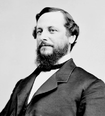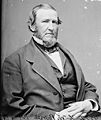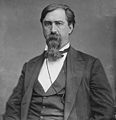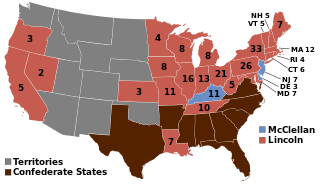
Presidential elections were held in the United States on November 8, 1864, near the end of the American Civil War. Incumbent President Abraham Lincoln of the National Union Party easily defeated the Democratic nominee, former General George B. McClellan, by a wide margin of 212–21 in the electoral college, with 55% of the popular vote. For the election, the Republican Party and some Democrats created the National Union Party, especially to attract War Democrats.
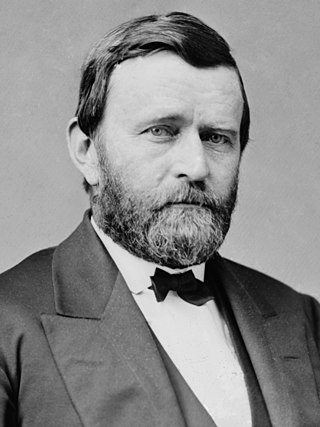
Presidential elections were held in the United States on November 3, 1868. In the first election of the Reconstruction Era, Republican nominee Ulysses S. Grant defeated Horatio Seymour of the Democratic Party. It was the first presidential election to take place after the conclusion of the American Civil War and the abolition of slavery. It was the first election in which African Americans could vote in the reconstructed Southern states, in accordance with the First Reconstruction Act.
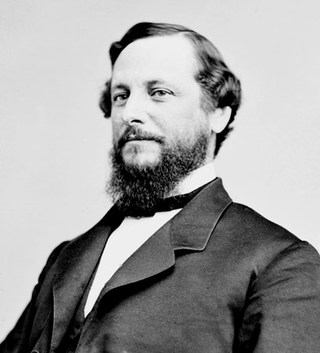
George Hunt Pendleton was an American politician, lawyer and diplomat. He represented Ohio in both houses of Congress and was the unsuccessful Democratic nominee for Vice President of the United States in 1864.

In the 1860s, the Copperheads, also known as Peace Democrats, were a faction of the Democratic Party in the Union who opposed the American Civil War and wanted an immediate peace settlement with the Confederates.
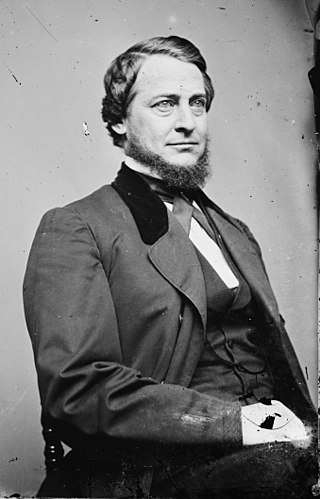
Clement Laird Vallandigham was an American lawyer and politician who served as the leader of the Copperhead faction of anti-war Democrats during the American Civil War.

The 1924 Democratic National Convention, held at the Madison Square Garden in New York City from June 24 to July 9, 1924, was the longest continuously running convention in United States political history. It took a record 103 ballots to nominate a presidential candidate. It was the first major party national convention that saw the name of a woman, Lena Springs, placed in nomination for vice president. John W. Davis, a dark horse, eventually won the presidential nomination on the 103rd ballot, a compromise candidate following a protracted convention fight between distant front-runners William Gibbs McAdoo and Al Smith.

Horatio Seymour was an American politician. He served as Governor of New York from 1853 to 1854 and from 1863 to 1864. He was the Democratic Party nominee for president in the 1868 United States presidential election, losing to Republican Ulysses S. Grant.
The 1868 Democratic National Convention was held at the Tammany Hall headquarters building in New York City between July 4, and July 9, 1868. The first Democratic convention after the conclusion of the American Civil War, the convention was notable for the return of Democratic Party politicians from the Southern United States.

Joel Parker was an American attorney and Democratic Party politician who served two non-consecutive terms as the 20th governor of New Jersey from 1863 to 1866 and 1872 to 1875. As a Democratic governor during the American Civil War, Parker was one of the leading critics of the Abraham Lincoln administration's domestic and military policy, though he was generally a supporter of the Union war effort. In 1868 and 1876, he was nominated for President of the United States as a favorite son by New Jersey's party delegation.
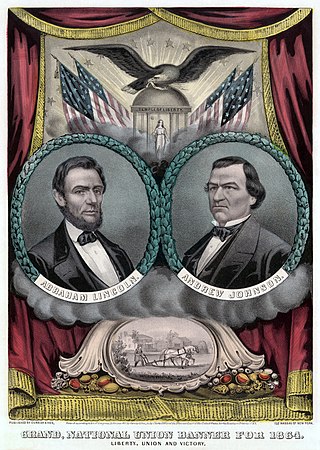
The National Union Party, commonly the Union Party or Unionists, was a wartime coalition of Republicans, War Democrats, and border state Unconditional Unionists that supported the Lincoln Administration during the American Civil War. It held the 1864 National Union Convention that nominated Abraham Lincoln for president and Andrew Johnson for vice president in the 1864 United States presidential election. Following Lincoln's successful re-election and assassination, Johnson tried and failed to sustain the Union Party as a vehicle for his presidential ambitions. The coalition did not contest the 1868 elections, but the Republican Party continued to use the "Union Republican" label throughout the period of Reconstruction.
Popular opposition to the American Civil War, which lasted from 1861 to 1865, was widespread. Although there had been many attempts at compromise prior to the outbreak of war, there were those who felt it could still be ended peacefully or did not believe it should have occurred in the first place. Opposition took the form of both those in the North who believed the South had the right to be independent and those in the South who wanted neither war nor a Union advance into the newly declared Confederate States of America.
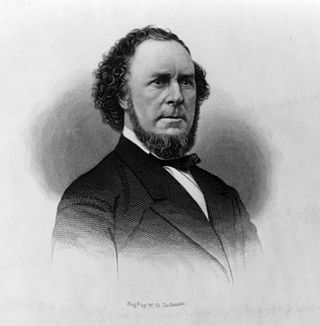
Alexander Long was a Democratic United States Congressman who served in Congress from March 4, 1863, to March 3, 1865.
The Crisis was a newspaper published during the first half of the American Civil War by Samuel Medary that was critical of the American government's decision to limit slavery, and following the beginning of the war against the Confederate States of America, to wage war against the South. It was presented as the newspaper for favor with "Peace Democrats" - those northerners who sided with the Confederate cause during the war.

The 1857 New York state election was held on November 3, 1857, to elect the Secretary of State, the State Comptroller, the Attorney General, the State Treasurer, the State Engineer, a Judge of the New York Court of Appeals, a Canal Commissioner and an Inspector of State Prisons, as well as all members of the New York State Assembly and the New York State Senate.

The 1864 National Union National Convention was the United States presidential nominating convention of the National Union Party, which was a name adopted by the main faction of the Republican Party in a coalition with many, if not most, War Democrats after some Republicans and War Democrats nominated John C. Frémont over Lincoln. During the Convention, the party officially called for the end of the ongoing Civil War, the eradication of slavery and the adoption of the Emancipation Proclamation.
The New Departure refers to the political platform adopted after 1865 by the US Democratic Party, and the subsequently deployed strategy, in order to distance itself from its pro-slavery and Copperhead history, in an effort to broaden its political base and to focus on issues on which it had more of an advantage, especially economic ones.
War Democrats in American politics of the 1860s were members of the Democratic Party who supported the Union and rejected the policies of the Copperheads, or Peace Democrats. The War Democrats demanded a more aggressive policy toward the Confederacy and supported the policies of Republican President Abraham Lincoln when the American Civil War broke out a few months after his victory in the 1860 presidential election.

In 1868, the Democrats nominated former New York Governor Horatio Seymour for President and Francis Preston Blair Jr. for Vice President. The Seymour-Blair ticket ran on a platform which supported national reconciliation and states' rights, opposed Reconstruction, and opposed both Black equality and Black suffrage. Meanwhile, the Republican presidential ticket led by General Ulysses S. Grant benefited from Grant's status as a war hero and ran on a pro-Reconstruction platform. Ultimately, the Seymour-Blair ticket ended up losing to the Republican ticket of General Ulysses S. Grant and House Speaker Schuyler Colfax in the 1868 U.S. presidential election.

In the 1864 U.S. presidential election, the Democrats nominated Union Army General George McClellan for U.S. President and Ohio U.S. Representative George Pendleton for U.S. Vice President. During the campaign, McClellan vowed to do a better job of prosecuting the Union Army effort in the American Civil War than incumbent U.S. President Abraham Lincoln did. Ultimately, the McClellan-Pendleton ticket lost to the National Union ticket of Abraham Lincoln and former U.S. Senator Andrew Johnson.

The 1856 New York gubernatorial election was held on November 4, 1856. Incumbent Governor Myron Clark did not run for re-election to a second term in office. In the race to succeed him, John A. King defeated Amasa J. Parker and Erastus Brooks to become the first Republican elected Governor of New York.

